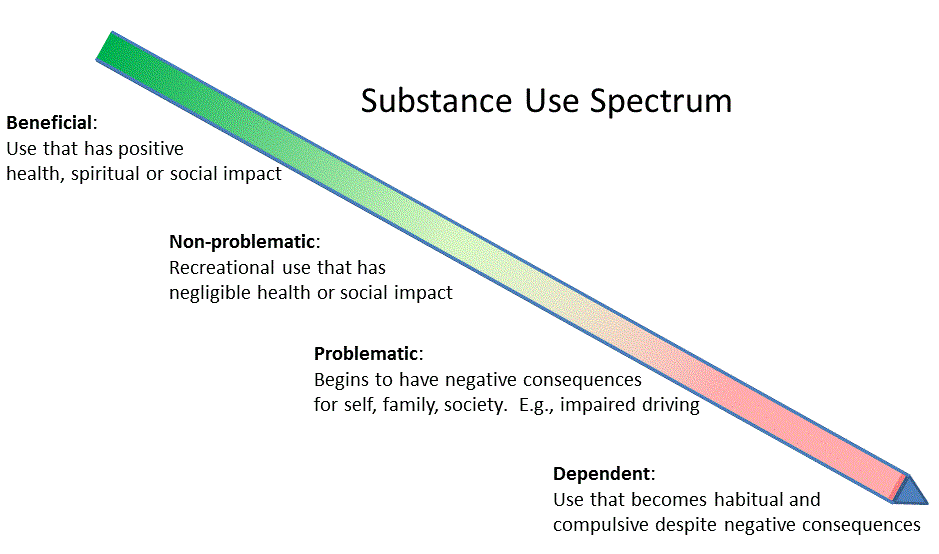Individuals can flow along the spectrum and move to different points along it depending on our current circumstances.

These circumstances can be signs that an individual’s use has become or may become problematic:
- Where the substances take over your ability to participate in daily activities, work, social groups, and your usual routines.
- You are finding that you are only participating in events that will allow for substances to be consumed/behaviours to occur.
- Your identity starts to be become dependent upon substances and your next ability to use.
Gambling and Gaming are very similar in nature to substance use. The response these behaviours provide the brain is the same endorphin high due to the increase in dopamine in your brain.
Often the thought is that if you are not putting substances and items into your body you are not doing as much damage. This would be a false perception on reality. These behaviours can be just as risky and harmful to your overall health and well-being.
All compulsive behaviours stem from pain and experiences. Each person’s pain is relative to themselves. The key piece when working with someone that experiences an addiction is looking past the behaviour and into who that individual is and what brought them to this point. Non-judgmental approach in treatment is the key first step.
“Any passion can become an addiction; but then how to distinguish between the two? The central question is: who’s in charge, the individual or their behaviour? It’s possible to rule a passion, but an obsessive passion that a person is unable to rule is an addiction. And the addiction is the repeated behaviour that a person keeps engaging in, even though he knows it harms himself or others.”
– Gabor Mate
Family Members (of those with an addiction—both active and past)
Watching your loved one experiencing the pain of addiction impacts more than just the individual with the addiction. It impacts the entire support unit. This is why an addiction is often referred to as the family addiction/family disease. Co-dependence, Enabling behaviours, and Lack of understanding can all contribute to your own destruction (as the family/support member).Therapy is an effective tool to overcome these experiences, learn new coping strategies, and develop a balance within your own life.
Healthiness breeds healthiness! If you are not at your best, you cannot be the best support for another.
“It is impossible to understand addiction without asking what relief the addict finds, or hopes to find, in the drug or the addictive behaviour.” – Gabor Mate
*Counselling can occur on an individual basis, or sessions can be set up for multiple members of your family to work together towards making some changes.
The Diagnostic and Statistical Manual (DSM-IV) sets the expectation of what an addiction, trauma, and mental health disorder is. This provides the framework of ‘what classifies as what.’
This information, although helpful, is not everything. Each person is a unique individual with different experiences. The ideal within each therapy session is to see past the current behaviours (or symptoms) of the diagnosis or labels and to work with the current needs.
What will better support you today to equate to a better tomorrow?! – Together we can determine what this is for you.
*I will not be providing you with any diagnosis (as I am not a physician) or labels (as I am not here to judge you).*
This information, although helpful, is not everything. Each person is a unique individual with different experiences. The ideal within each therapy session is to see past the current behaviours (or symptoms) of the diagnosis or labels and to work with the current needs.
What will better support you today to equate to a better tomorrow?! – Together we can determine what this is for you.
*I will not be providing you with any diagnosis (as I am not a physician) or labels (as I am not here to judge you).*







